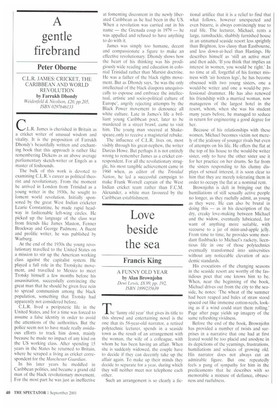Love beside the sea
Francis King
A FUNNY OLD YEAR by Alan Brownjohn Dewi Lewis, £8.99, pp. 192, ISBN 1899235639 he 'funny old year' that gives its title to this shrewd and entertaining novel is the one that its 58-year-old narrator, a retired polytechnic lecturer, spends in a seaside town as the result of an arrangement with the woman, the wife of a colleague, with whom he has been having an affair. When she is suddenly widowed, the couple have to decide if they can decently take up the affair again. To make up their minds they decide to separate for a year, during which they will neither meet nor telephone each other.
Such an arrangement is so clearly a fic
tional artifice that it is a relief to find that what follows, however unexpected and even bizarre, is always convincingly true to real life. The lecturer, Michael, rents a large, ramshackle, shabbily furnished house in an unnamed seaside resort less sprightly than Brighton, less classy than Eastbourne, and less down-at-heel than Hastings. He describes himself as 'still an active man' and then adds, if you think that implies an interest in women, you would be right.' In no time at all, forgetful of his former mistress with 'air hostess legs', he has become obsessed with two young sisters, one a would-be writer and one a would-be professional drummer. He has also renewed his friendship with a married woman, now manageress of the largest hotel in the resort, whom, when she was his student many years before, he managed to seduce in return for engineering a good degree for her.
Because of his relationships with these women, Michael becomes victim not merely of the jealousy of younger rivals but even of attempts on his life. He offers the flat at the top of his house to the would-be writer sister, only to have the other sister use it for her practice on her drums. So far from the sisters responding to his clumsy displays of sexual interest, it is soon clear to him that they are merely tolerating them in order to occupy the flat at a nominal rent.
Brownjohn is deft in bringing out the humiliations of still sexually active people no longer, as they ruefully admit, as young as they were. He can also be brutal in doing this — as in his description of the dry, creaky love-making between Michael and the widow, eventually lubricated, for want of anything more suitable, with recourse to a jar of mint-and-apple jelly. From time to time, he provides some mordant flashbacks to Michael's rackety, licentious life in one of those polytechnics eventually transformed into universities without any noticeable elevation of academic standards.
His evocations of the changing seasons in the seaside resort are worthy of the fastidious poet that one knows him to be. When, near the beginning of the book, Michael drives out from the city to the seaside, he notes: The wheat of the summer had been reaped and bales of straw stood spaced out like immense cotton-reels, looking as if a wind could start them rolling.' Page after page yields up imagery of the same refreshing vividness.
Before the end of the book, Brownjohn has provided a number of twists and surprises in a narrative that one had at first feared would be too placid and anodyne in its depictions of the yearnings, frustrations, humiliations and solaces of growing old. His narrator does not always cut an admirable figure. But one repeatedly feels a pang of sympathy for him in the predicaments that he describes with so memorable a mixture of defiance, obtuseness and ruefulness.


























































 Previous page
Previous page